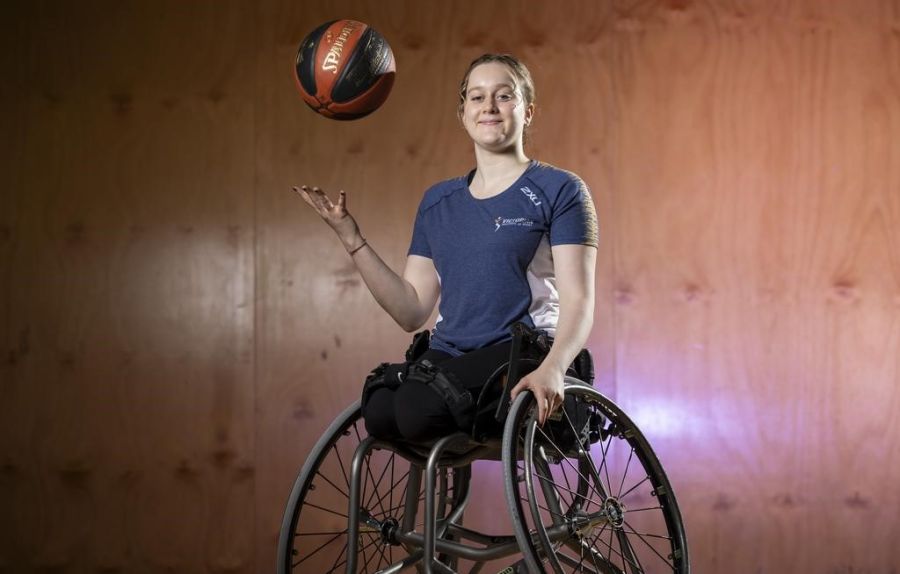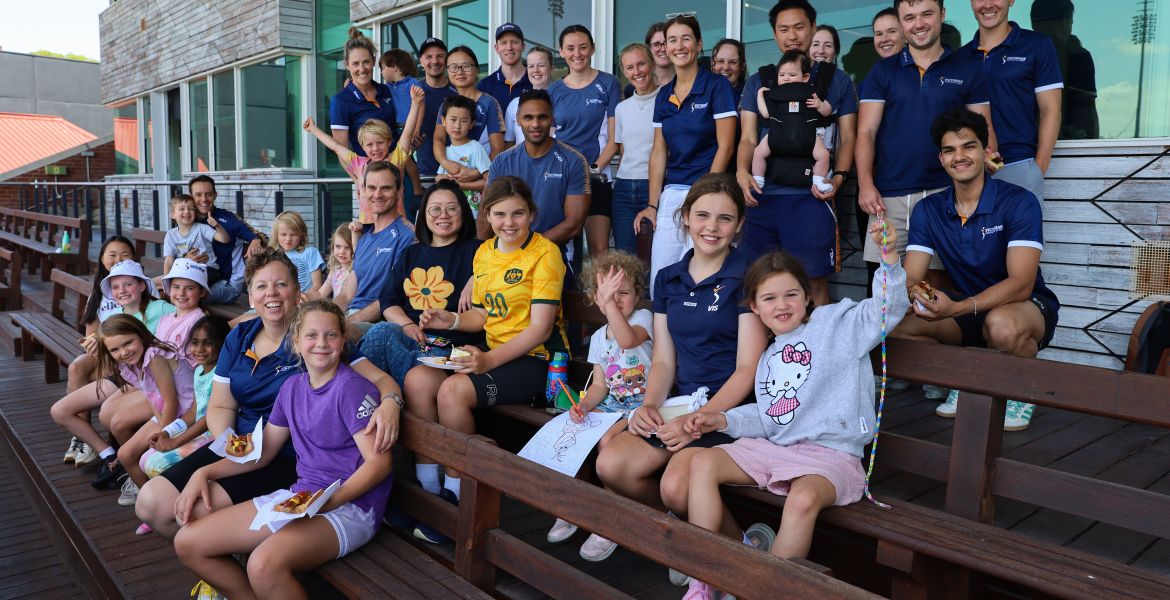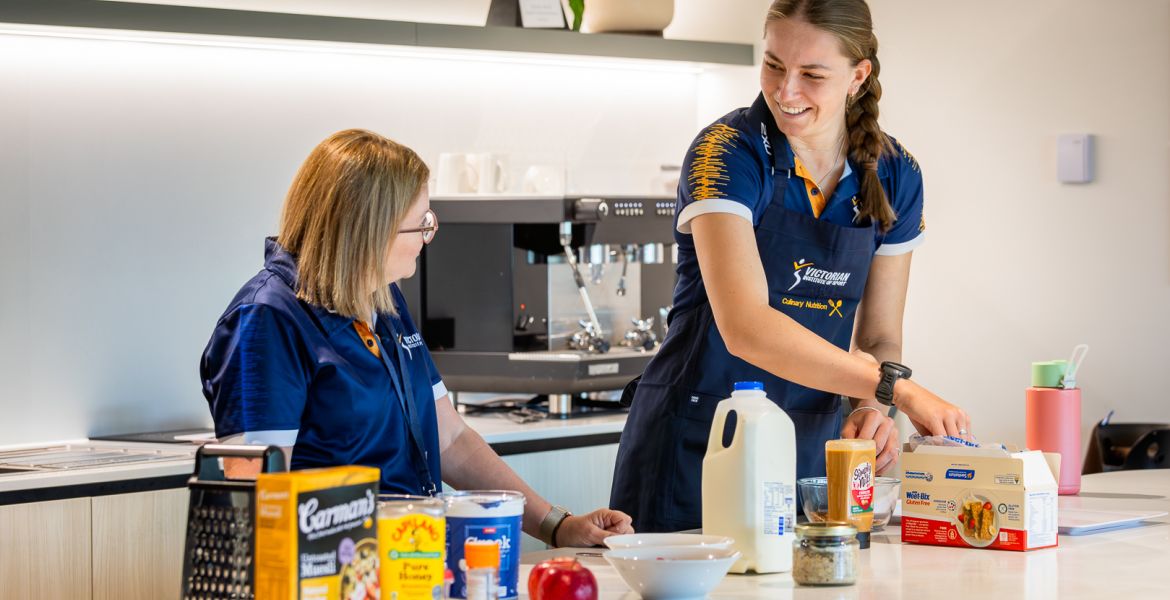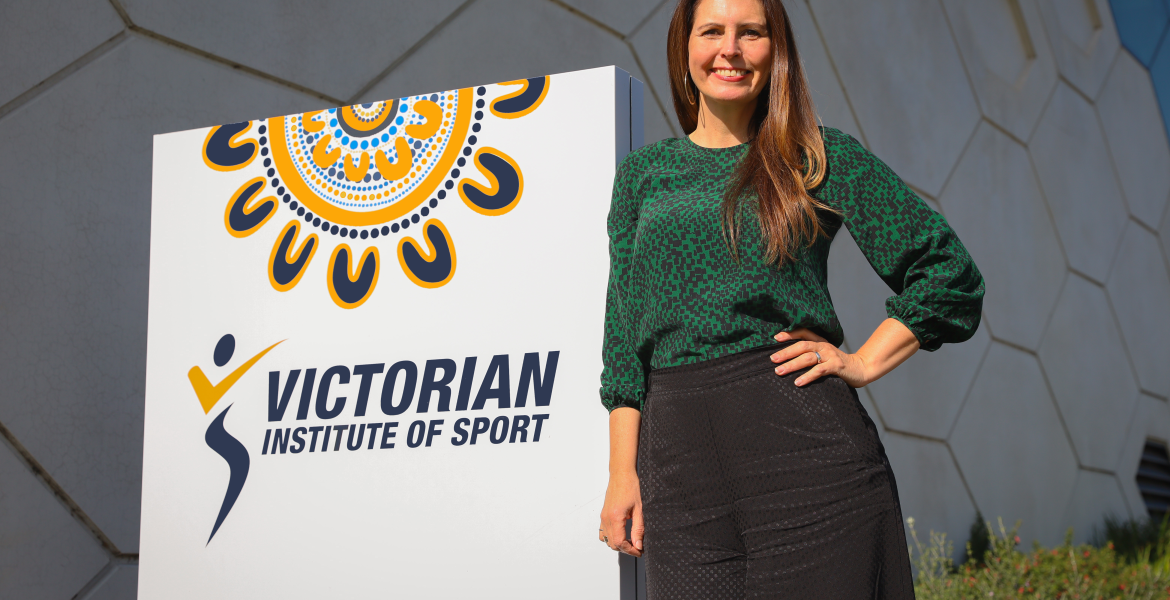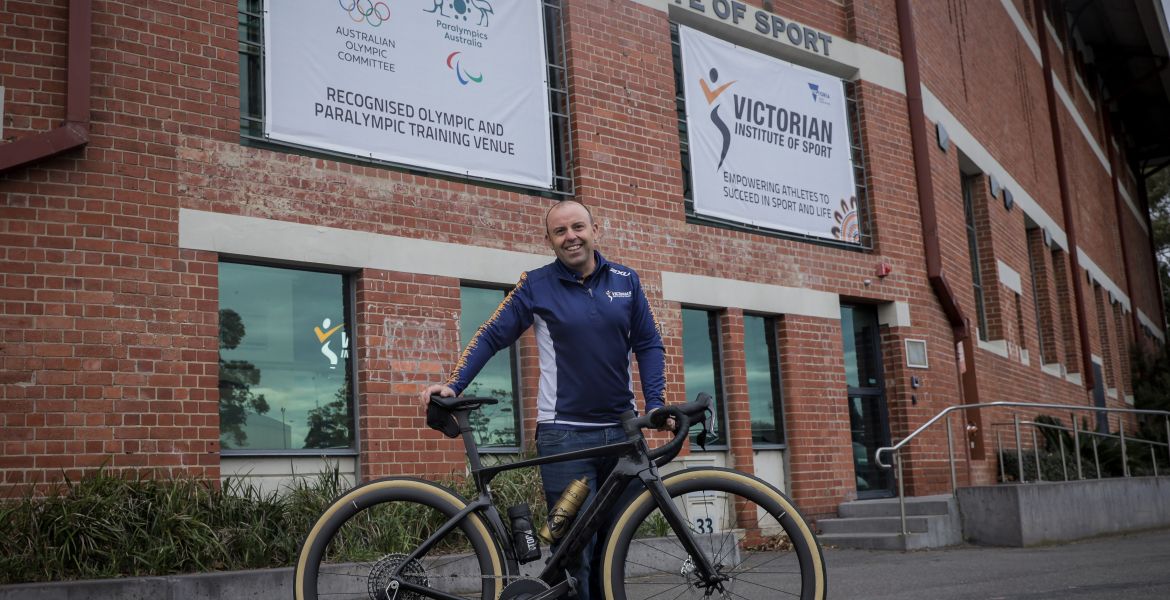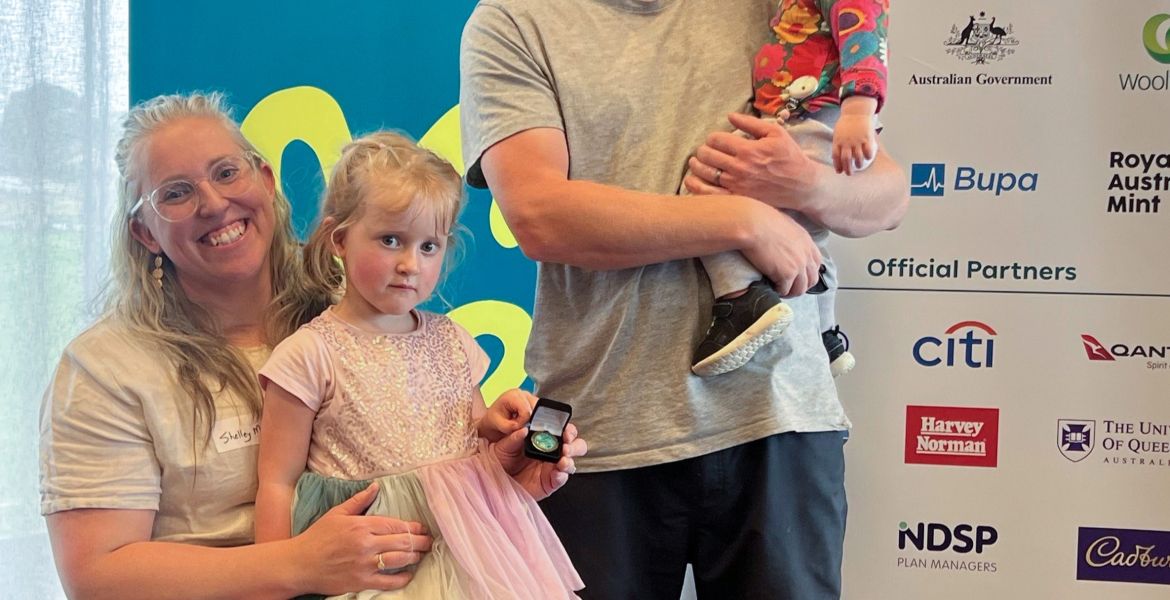Laura Davoli’s memory of wearing her prosthetic “Barbie legs” for the first time is still vivid.
She was in Grade 4, at her First Communion at St Therese’s School in Essendon, and walked down the aisle for a blessing.
“I would say that was a significant shift, because I feel like I remember everything after that moment,” she said.
“Everything before, I feel like I could just explain it all in one day.”
Three years prior, a rare infection cut blood flow to Davoli’s limbs while she was in hospital and both her legs had to be amputated below the knees.
Once she left the hospital, the seven-year-old had to adjust not only to her own radically altered life, but to other people’s perceptions.
Her older brother Roman helped her to realise not everything had changed due to “amazing” sibling teasing, but the exclusion and loneliness that occasionally occurred was difficult to comprehend – particularly as a teenager.
Sport played a significant role in shaping Davoli’s childhood, and when she joined the national women’s wheelchair basketball team it became a true passion and inspiration.
“They (teammates) all really helped me to accept myself for who I was and welcome me into a new sort of perspective,” she said.
“That it’s okay to be who I am; my disability is a part of me, I shouldn’t be talking about it in a negative way.”
As the 18 year-old prepared for last week’s Under-25 world championships, as well as Year 12 exams, she found time for the Herald Sun’s Big V interview to share her story.
No one knew what was happening
When Davoli was growing up, cousins were everywhere.
Her grandparents on her father Mario’s side were from Italy, and migrated to Australia as teenagers where they met and married.
Her mother, Sharon, is also part of a big family.
“I have many cousins, some I haven’t even met before,” she said.
“They’re all much older than me; I’m the youngest cousin, the baby.”
Her direct family lives in Essendon, and in 2012 had just shifted homes to embark on a renovation when Davoli became sick.
“One day, my legs felt really sore, and I didn’t really know what was happening,” she said.
“My dad was actually away in America for work, so my mum took me to the hospital, my grandma looked after my brother.
“We didn’t really know what was going on, the hospital didn’t really understand it either.”
Davoli was initially sent home but after deteriorating, she was admitted again for further tests.
Weeks later, specialists diagnosed a rare bacterial infection known as streptococcal Group A.
“I’m not going to tell you how to spell it,” Davoli said.
“My right hip is where the infection started; it just sort of went through the bloodstream and was caught too late.
“They had to amputate below the knee on both my legs, and my right hip now, the bone has completely been eaten away, it’s pretty much just like a stick.”
As her body was pumped with antibiotics at the Royal Children’s Hospital, Davoli went into cardiac arrest twice and was hooked up to a heart-lung machine.
Doctors feared she would not survive a sudden fall in blood pressure – known as septic shock – that followed the infection.
Somehow, the slightly built seven-year-old pulled through.
Back to school
After months of recovery, Davoli returned to St Therese’s School in Essendon at the beginning of the new school year.
She was in Grade 2.
“Obviously it was surprising for everyone, you know; I came back with half my body missing,” she said.
“My primary school was so supportive. They were incredible people, and my family and I will never forget what they did for us.”
Image: Laura Davoli, aged 8, at St Therese's School.
Being the only kid in a wheelchair, however, was challenging.
Despite good intentions, safety nets put around Davoli sometimes led to exclusion.
“Naturally, they were terrified of what would go wrong,” she said.
“They would put me on the ground on a mat and then just sort of said to people, ‘you can sit on the mat with her, and you can play puzzles, or you can do this’.
“In that in that moment, when I was younger, I was like, ‘oh, everyone’s showing me attention. I’m special, I get a mat, no one else gets a mat’.
“I wasn’t even taking into consideration how much I was being excluded. You get older, you realise.”
Her brother Roman, who is 18 months older, was the only one who kept treating her “normal”.
“My brother was amazing; he kept teasing me, he kept bullying me like a normal person, like a normal sibling,” she said.
“He didn’t change his behaviour and I think that really helped me to accept that yes, I had changed physically, how different my life was going to be, but also how much would be the same and I could carry through into my new journey, into the new life I had to create.”
Others weren’t so supportive, and mum Sharon still tells the “gobsmacking” story of a parent asking if their 7-year-old son could come over to their house to ask 10-year-old Davoli about life in a wheelchair.
It wasn’t until recently, Davoli said, that she had an epiphany – thanks to a legal studies teacher – that she should control how her story was shared, not other people.
“I went on an excursion with my legal studies class, and I had two separate people come up to me and be like, ‘Oh, what happened?’” she said.
“My legal studies teacher went off at them; she was like, ‘this isn’t okay, you have no right to ask, this isn’t your business’.
“It’s insane how I didn’t realise how it wasn’t my responsibility to tell these people what happened to me.
“Then you get the occasional old man or old woman coming up and being like, ‘I’ll pray for you’.”
Need for speed
Before Davoli’s illness, dancing was a major part of her life.
“Losing that was definitely difficult, but being able to find something similar in basketball was amazing.”
Before basketball, there was swimming and tennis.
Early on the message that swimming was “good for your health” was laid on a bit thick by her family.
“It sort of just didn’t seem fun anymore,” she said.
“It was also an isolating experience because they would put me in my own lane, by myself.
“They put all the kids in the other lane because I wasn’t as fast, I wasn’t kicking, people would just overtake me.
“I would say it was lonely.”
Davoli later took up wheelchair tennis, and although her mum said she “always knew I was going to do something sporty”, it was through trial and error that she found her passion.
“As soon as I got sick I felt a bit lost, you know, as you do; you don’t really know what to do, or where to go from here,” she said.
“How do you, sort of, navigate life differently?
“I just fell into sport, you know, there was all these come and try days for a lot of different disabilities and stuff like that.”
Part of the enjoyment – and challenge – was mastering a sports wheelchair.
“I also loved it because I loved going fast, I just wanted to build up my speed and I just wanted to keep going as fast as I could,” she said.
“That was so enjoyable because I missed out on a lot of that during childhood, you know, not being able to get up and run around with the other kids and play tag and stuff like that.
“So being able to show my speed and show that I can do something close to running was pretty special for younger me.”
Gliders and devils
When an opportunity to try out for wheelchair basketball at the Melbourne Sports and Aquatic Centre came up, Davoli immediately realised she was joining something special.
Things went up a notch when she was asked in 2020 to participate in a national camp in Canberra for Australia’s Under 25 squad.
Davoli soon found that joining that team – nicknamed the Devils – and the full women’s squad – known as the Gliders – provided more than just sport.
This was important after a transition from childhood to teenage years that was “tough” due to a lack of local role models and people she could turn to with similar experiences.
“I think that was when I started to realise that I wasn’t going to be like everyone else, that I wasn’t going to be a normal teenager, I wasn’t going to have normal teenage experiences,” she said.
“I really had no one to tell me how I should be going through it, how I should navigate it.”
Basketball altered Davoli’s perspective, and her talent shone through early as she became a permanent fixture of the national team.
Not only was she succeeding on the court, the other athletes shared valuable life experiences.
“The older athletes, they really helped me to just realise that there’s more people like me, to realise I wasn’t alone, that there were people going through the same thing and it’s possible to get through it,” she said.
“All the gliders, all the devils, they all really helped me to accept myself for who I was and, you know, welcome me into a new sort of perspective of, ‘it’s okay to be who I am, my disability is a part of me I shouldn’t be talking about it in a negative way’.
A bright future
While finishing Year 12 is the immediate focus for Davoli, a world of opportunity awaits.
The Paris Paralympics are 10 months away, along with more international tours with the national squad.
“I’m looking forward to everything that’s coming,” she said.
It will be a hectic finish to 2023 for Davoli, who recently returned from the Under-25 World Championships in Thailand, where the Aussies were given a tough assignment of taking on tournament winners the US and runner-up the UK in early games.
The 18-year-old was described by Basketball Australia as a “standout” from a younger cohort who will be eligible for the 2027 world champs; topping the team’s rebound count with 46, to go with 45 points and 13 assists.
There will soon be a substantial lay-off from sport for Davoli, however, due to an operation to replace one of her hips in December.
She said there was one rite of passage that was booked in ahead of the hospital appointment, however.
“I’m doing schoolies, that was non-negotiable,” she laughed.
“Hopefully (the operation) will get me off crutches and I’ll get different prosthetics and be able to do more things.
“So that’s very exciting; very, very scary as well.
“I think the last time I had surgery, I had no idea what was going on I just got sent into the room and put under and then woke up but now I’m 18 and getting to know all the ins and outs of surgery and that’s terrifying.”
Davoli’s frustration of being unable to play basketball for months is palpable, but she hopes to be back on the court and training again early in the New Year.
Asked to describe what it’s like to be touring the world as a teenager after just a few years playing wheelchair basketball, Davoli pauses to consider her answer.
“I would say it’s pretty special and pretty cool to be doing this at 18,” she said.
“I’m pretty proud of myself.”

